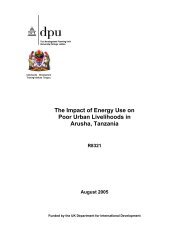EPA Review Annex Documents - DFID
EPA Review Annex Documents - DFID
EPA Review Annex Documents - DFID
Create successful ePaper yourself
Turn your PDF publications into a flip-book with our unique Google optimized e-Paper software.
Commission was forced to take up the serious challenge of ownership of the process by<br />
rejecting EU’s initial plan to send consultants and economists to ECOWAS, to help in the<br />
technical analysis. The <strong>EPA</strong> has facilitated the awareness and use of regional and<br />
national experts which hitherto was lacking, in particular because of scepticism<br />
regarding external consultants as the outcomes of their studies become suspicious.<br />
Lessons<br />
The main lessons can be summarised as follows:<br />
• It has taught West Africa in general and Nigeria in particular to brace up to realities of<br />
tough trade negotiation<br />
• ECOWAS countries have to get more serious in negotiations, making effective<br />
preparations towards negotiations and the need to have an adequate stock of trained<br />
manpower to negotiate<br />
• Adequate impact analysis is crucial to correct initial positions and reach compromise<br />
Dominican Republic<br />
Expectations<br />
As suggested above, the expectations of <strong>EPA</strong>s were based on obtaining market access<br />
in certain key products. Although prior to the start of the negotiations only about 10% of<br />
Dominican exports were directed to the European Union, but concentrated in a few<br />
sectors. For banana and rum producers, the EU market was the primary market of<br />
exports, and these and other sectors such as cigars, textiles, footwear, cocoa and<br />
vegetable producers had no preferential treatment under GSP. From a defensive point of<br />
view, after implementing the D.R.-CAFTA, the protectionist constituency was already<br />
very eroded and the D.R. position was always less defensive than its regional partners,<br />
Resource constraints impact on negotiation<br />
No major resource constraints were identified.<br />
Regional negotiation and integration<br />
The fact that the D.R. had previously negotiated an important trade agreement with the<br />
United States, which included all the market opening topics covered by the <strong>EPA</strong>, gave it<br />
also a certain degree of tolerance to a regional approach, particularly taking into account<br />
that for many issues, such as services, investments, government procurement, and<br />
fiscal concerns regarding market opening in goods, the CARIFORUM overall position<br />
tended to be more conservative than the D.R.’s. Also the role of the CRNM facilitating<br />
the formulation of regional positions was crucial for the D.R.<br />
Intangibles<br />
The <strong>EPA</strong> process has really improved the regional integration process by increasing the<br />
understanding by D.R. negotiators of CARICOM institutions. As a result, the D.R. has<br />
formally applied for CARICOM membership.<br />
82
















